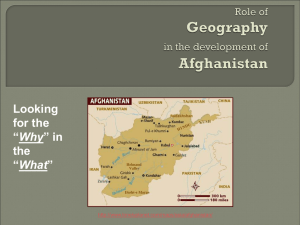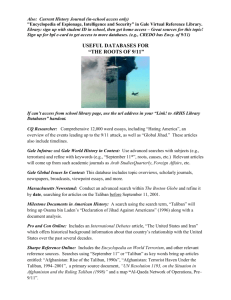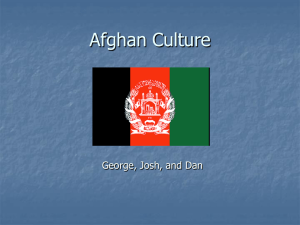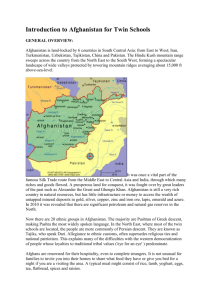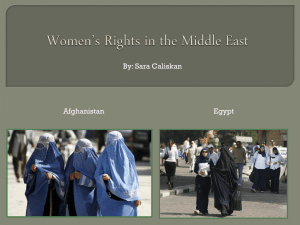Word - The Military Project
advertisement
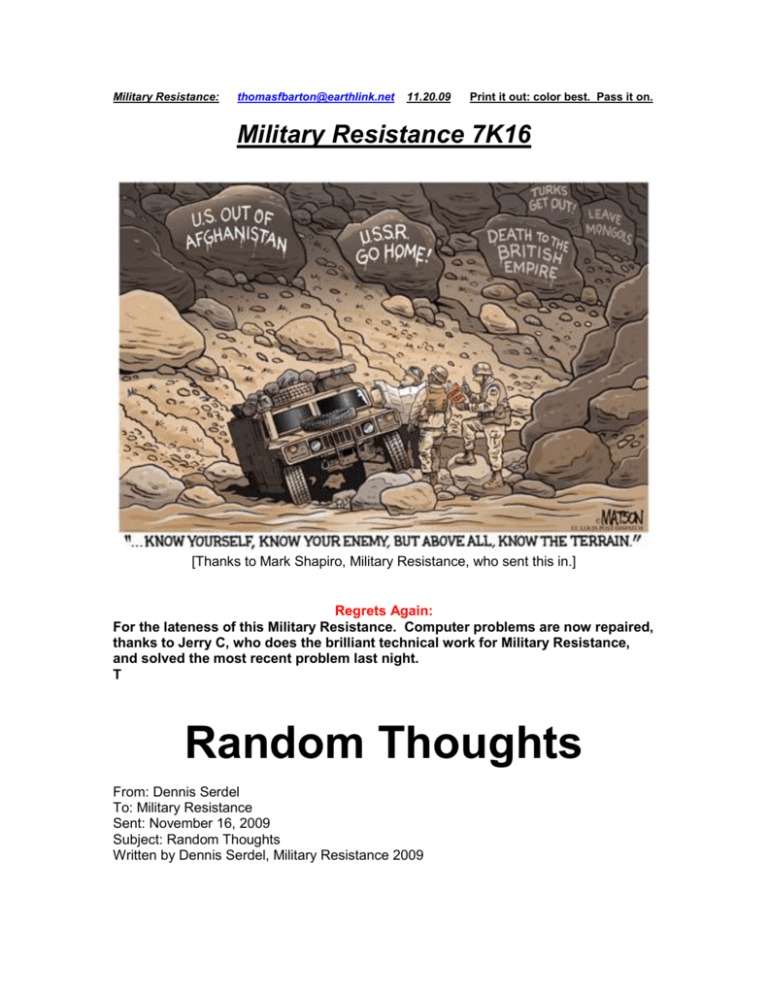
Military Resistance: thomasfbarton@earthlink.net 11.20.09 Print it out: color best. Pass it on. Military Resistance 7K16 [Thanks to Mark Shapiro, Military Resistance, who sent this in.] Regrets Again: For the lateness of this Military Resistance. Computer problems are now repaired, thanks to Jerry C, who does the brilliant technical work for Military Resistance, and solved the most recent problem last night. T Random Thoughts From: Dennis Serdel To: Military Resistance Sent: November 16, 2009 Subject: Random Thoughts Written by Dennis Serdel, Military Resistance 2009 Dennis Serdel, Vietnam 1967-68 (one tour) Light Infantry, Americal Div. 11th Brigade, purple heart, Veterans For Peace 50 Michigan, Vietnam Veterans Against The War, United Auto Workers GM Retiree, in Perry, Michigan ******************************************************** From: Dennis Serdel To: Military Resistance Sent: November 16, 2009 Subject: Random Thoughts by Dennis Random Thoughts As long as the training for War makes Orders Uniforms Lines Tests Fascism Clean Weapons Numbers buffed Buckles shiny Boots clean Shaves from randomness and chaos, War itself Battles Firefights IEDs will reduce order back to chaos and randomness as choppers load up and mechanically fly the wounded and dead back to Organization. The heart beats and don’t beats and lung inhale chaos exhale Orders Sameness Repeatedness or try to as War changes into complete uncontrollable madness making nonsense exhales randomness and chaos with every beat of the heart with every exhale and inhale of the lungs like Orders and Disorders Sanity & Insanity every Soldier will die some every Country will kill some. For Numbers like Millions Billions Trillions Soldiers heading into the night and day when nobody knows the difference then the Days are just Numbers like Months like Short Time like deadness before then War will reduce Order back to randomness and chaos. Higher Ups spin Keys Numbers on Hidden Banks to throw more money into their Accounts not thinking of the cost to the Little People or Non-People as they see it just another Day on Wall Street with No God but themselves and No God but to make Order for themselves from chaos and randomness as they play a Rich God Bless America Game and the money that they make by killing People Lower Beings unlike themselves as they randomly spend their money on themselves in a Military manner as they shout Orders just kill them anyone though they are Not the Enemy just do It Shut-up follow Orders, wear your Uniforms, throw your body into Firefights drive into IEDs. Just drive down the road and religiously kill them all randomly and chaotically because You are Gods too if you believe in Gods. MORE: MORE OF DENNIS SERDEL’S WORK IN PEACE SPEAKS FROM THE MIRROR: Get Some While There Still Are Some To Get: [You know the power of the poems by Dennis Serdel from the front pages of Military Resistance: now they’re in book form: Ordering information below: T] DENNIS SERDEL: Shipped to Vietnam in November 1967. Returned home in October 1968 to Kalamazoo, Michigan. Joined Veterans For Peace in January 1990. Joined Vietnam Veterans Against the War when Iraq and Afghanistan War started. Books are $15 Post Paid: Check or Money Order Payable to Dennis Serdel Dennis Serdel 339 Oakwood Lane Perry, Michigan 48872 Walt Whitman Carl Sandburg Allan Ginsberg Now: Dennis Serdel T IRAQ WAR REPORTS ENOUGH OF THIS STUPID SHIT; ALL HOME NOW A U.S. infantryman from digs at a suspected cache site as an Iraqi soldier looks on during a sweep in northwestern Baghdad November 1, 2009. REUTERS/U.S. Army/Sgt. Mark Burrell/Handout Resistance Action Nov. 15 (Xinhua) & Nov 18, 2009 Reuters & Nov 20 (Reuters) Three policemen were wounded when a roadside bomb exploded near their patrol in the town of Jedidat al-Shatt, near the provincial capital city of Baquba, some 65 km northeast of Baghdad, the source added. The blast destroyed a police vehicle and several nearby buildings and civilian cars, he said. A roadside bomb struck a police patrol, wounding two policemen, in Garma, 30 km (20 miles) northwest of Baghdad, police said. Guerrillas stormed a house and killed a local Arab pro-government militia leader and his cousin in a village near Baquba, 65 km (40 miles) northeast of Baghdad, police said. A bomb planted on a bicycle wounded a policeman in Falluja, 50 km (32 miles) west of Baghdad, on Tuesday evening, police said. A roadside bomb struck a police patrol, wounding a policeman in western Mosul, 390 km (240 miles) north of Baghdad, police said. IF YOU DON’T LIKE THE RESISTANCE END THE OCCUPATIONS OCCUPATION ISN’T LIBERATION ALL TROOPS HOME NOW! AFGHANISTAN WAR REPORTS Soldier Was ‘Real G.I. Joe’ Oct 27, 2009 By R. STICKNEY and PAUL KRUEGER, NBC Universal, Inc. Memories and tears filled an Imperial Beach home Tuesday as family and friends gathered to mourn a local soldier killed Monday in Afghanistan. Fourteen Americans, including three DEA agents, died in two separate helicopter crashes on the same day in southern Afghanistan. At a home on Tremaine Way, Dolores Wallen was remembering the grandson she had raised, U.S. Special Forces Sgt. David Metzger. Wallen learned of Metzger’s death when she was visited by a representative of the U.S. Army Monday night. Metzger’s childhood friend Rigo Rodriguez of Otay Mesa arrived to the Wallace home after hearing the news. When he walked in, he immediately went to hug Dolores. The two of them embraced for more than a few minutes and wept. “Be here for me,” Wallen asked him. Rodriguez shook his head in disbelief. He had just talked with Metzger on the phone Sunday. “He made me feel like everything was okay,” he said. “That he was out of harm’s way.” For the next several minutes, Wallen and Rodriguez reminisced about the little boy who played rough but grew up to be one of the best of the best – a member of the Green Berets. Born in San Diego on April 7, 1977, Metzger was raised in Imperial Beach where he played Little League with Rodriguez. He attended Mar Vista High school where he met his future wife. After high school, Metzger decided to join the military to help support his new wife and their baby. Wallen remembers that she didn’t want him to go but he told her he needed to support his family. Metzger was recruited in Chula Vista and eventually trained to be a member of Green Berets in North Carolina. He served in Afghanistan, returning four times according to Wallen. “He was just a driven character. He always over achieved,” said his friend Rodriguez. “Everything he did, he did to the top of his capabilities.” “He had a lot of bars on the side of his arm and he was very proud of that,” according to Rodriguez who then quietly added, “He’s my real G.I. Joe.” Metzger’s wife will be returning to California to help with burial arrangements. “In anything he did, he wanted to achieve and be top at it. He was a champion,” Rodriguez said repeating the word again for Wallen, holding his hand and sitting next to him on the couch. “A champion,” he whispered again. What You’re Dying For: Afghanistan And Iraq Near The Top Of The List Of The Most Corrupt Nations On Earth Nov 17 By KIRSTEN GRIESHABER, Associated Press Writer [Excerpts] Afghanistan has slipped three places to become the world’s second most-corrupt country despite billions in aid meant to bolster the government against a rising insurgency, according to an annual survey of perceived levels of corruption. Only lawless Somalia, whose weak U.N.-backed government controls just a few blocks of the capital, was perceived as more corrupt than Afghanistan in Transparency International’s Corruption Perceptions Index. Iraq saw some improvement, rising to 176 of 180 countries, up two places up from last year. In Iraq, corruption has become widespread since the U.S.-led invasion that toppled Saddam Hussein in 2003 with scarcity of serious government measures against corrupted officials. That has undermined the largest nation-building efforts with siphoning billions of dollars away from the country’s struggling economy, increasing frustrations among Iraqis mainly over corruption, lingering violence and poor public services. “The single largest failure of the anti-war movement at this point is the lack of outreach to the troops.” Tim Goodrich, Iraq Veterans Against The War Welcome To Obama’s Sewer: “The Police Are Corrupt. The Prosecutors Are Corrupt. The Judges Are Corrupt” “Afghans Have A Name For The Huge, Gaudy Mansions That Have Sprung Up In Kabul’s Wealthy Sherpur Neighborhood” They Call Them “Poppy Palaces” An chewing gum vendor waits for customers in front of the new houses at Sherpur, one of the wealthiest neighborhoods in Kabul. (Rodrigo Abd / Associated Press) November 18, 2009 By Alexandra Zavis, The Los Angeles Times [Excerpts] Reporting from Kabul, Afghanistan – Afghans have a name for the huge, gaudy mansions that have sprung up in Kabul’s wealthy Sherpur neighborhood since 2001. They call them “poppy palaces.” The cost of building one of these homes, which are adorned with sweeping terraces and ornate columns, can run into the hundreds of thousands of dollars. Many are owned by government officials whose formal salaries are a few hundred dollars a month. To the capital’s jaded residents, there are few more potent symbols of the corruption that permeates every level of Afghan society, from the traffic policemen who shake down motorists to top government officials and their relatives who are implicated in the opium trade. On Monday, the interior minister, national security director, attorney general and chief justice of the Supreme Court joined forces to announce a new crime-fighting unit to take on the problem. But in the streets, bazaars and government offices, where almost every brush with authority is said to result in a bribe, few take the promises to tamp down corruption seriously. “It’s like a sickness,” merchant Hakimullah Zada said. “Everyone is doing it.” In these tough economic times, Zada said, there’s one person he can count on to visit his tannery: a city inspector. The lanky municipal agent frowns disapprovingly when he finds Zada and five other leather workers soaking and pounding hides in the grimy Kabul River and demands his cut -- the equivalent of about $40. “He says we are polluting the river,” Zada says. “So we have to pay every day. Otherwise, he will report us to the municipality, and they will close down our shops.” A 2008 survey by Integrity Watch Afghanistan found that a typical household pays about $100 a year in bribes in a country where more than half the population survives on less than $1 a day. Government salaries start at less than $100 a month, and almost everything has its price: a business permit, police protection, even release from prison. When Zada was afraid of failing his high school exams, he handed his teacher an envelope stuffed with more than 1,500 Afghanis -- about $30. He passed with flying colors. Abdul Jabar Sabit, a former attorney general who between 2006 and 2008 declared a jihad, or holy war, against corruption, said he quickly learned that a class of high-ranking officials is above the law. They include members of parliament, provincial governors and Cabinet ministers. Sabit estimates that he filed corruption charges against more than 300 provincial officials before he was dismissed in 2008. Few were convicted, and “none of them are in jail now,” he said. An investigation by the High Office of Oversight and Anti-Corruption, set up more than a year ago to oversee the government’s efforts to fight graft, found that on average it took 51 signatures to register a vehicle. Each signature had its price, for a total cost of about $400. “It is hardly surprising if Afghans prefer to bribe policemen on a daily basis to turn a blind eye to their unregistered vehicles,” said Ershad Ahmadi, the bureau’s British-educated deputy director. “The police are corrupt. The prosecutors are corrupt. The judges are corrupt,” Ahmadi said. U.S. Government Paying Insurgents Killing U.S. Troops: “It Is An Accepted Fact Of The Military Logistics Operation In Afghanistan That The US Government Funds The Very Forces American Troops Are Fighting” “US Military Officials In Kabul Estimate That A Minimum Of 10% Of The Pentagon’s Logistics Contracts-Hundreds Of Millions Of Dollars-Consists Of Payments To Insurgents” “Now The Government Is So Weak,” He Added, “Everyone Is Paying The Taliban” [Thanks to Mark Shapiro, Military Resistance, and Phil G, who sent this in.] The real secret to trucking in Afghanistan is ensuring security on the perilous roads, controlled by warlords, tribal militias, insurgents and Taliban commanders. The American executive I talked to was fairly specific about it: “The Army is basically paying the Taliban not to shoot at them. It is Department of Defense money.” That is something everyone seems to agree on. November 11, 2009 By Aram Roston, The Nation On October 29, 2001, while the Taliban’s rule over Afghanistan was under assault, the regime’s ambassador in Islamabad gave a chaotic press conference in front of several dozen reporters sitting on the grass. On the Taliban diplomat’s right sat his interpreter, Ahmad Rateb Popal, a man with an imposing presence. Like the ambassador, Popal wore a black turban, and he had a huge bushy beard. He had a black patch over his right eye socket, a prosthetic left arm and a deformed right hand, the result of injuries from an explosives mishap during an old operation against the Soviets in Kabul. But Popal was more than just a former mujahedeen. In 1988, a year before the Soviets fled Afghanistan, Popal had been charged in the United States with conspiring to import more than a kilo of heroin. Court records show he was released from prison in 1997. Flash forward to 2009, and Afghanistan is ruled by Popal’s cousin President Hamid Karzai. Popal has cut his huge beard down to a neatly trimmed one and has become an immensely wealthy businessman, along with his brother Rashid Popal, who in a separate case pleaded guilty to a heroin charge in 1996 in Brooklyn. The Popal brothers control the huge Watan Group in Afghanistan, a consortium engaged in telecommunications, logistics and, most important, security. Watan Risk Management, the Popals’ private military arm, is one of the few dozen private security companies in Afghanistan. One of Watan’s enterprises, key to the war effort, is protecting convoys of Afghan trucks heading from Kabul to Kandahar, carrying American supplies. ************************************** Welcome to the wartime contracting bazaar in Afghanistan. It is a virtual carnival of improbable characters and shady connections, with former CIA officials and ex-military officers joining hands with former Taliban and mujahedeen to collect US government funds in the name of the war effort. In this grotesque carnival, the US military’s contractors are forced to pay suspected insurgents to protect American supply routes. It is an accepted fact of the military logistics operation in Afghanistan that the US government funds the very forces American troops are fighting. And it is a deadly irony, because these funds add up to a huge amount of money for the Taliban. “It’s a big part of their income,” one of the top Afghan government security officials told The Nation in an interview. In fact, US military officials in Kabul estimate that a minimum of 10 percent of the Pentagon’s logistics contracts--hundreds of millions of dollars--consists of payments to insurgents. ******************************************** Understanding how this situation came to pass requires untangling two threads. The first is the insider dealing that determines who wins and who loses in Afghan business, and the second is the troubling mechanism by which “private security” ensures that the US supply convoys traveling these ancient trade routes aren’t ambushed by insurgents. A good place to pick up the first thread is with a small firm awarded a US military logistics contract worth hundreds of millions of dollars: NCL Holdings. Like the Popals’ Watan Risk, NCL is a licensed security company in Afghanistan. What NCL Holdings is most notorious for in Kabul contracting circles, though, is the identity of its chief principal, Hamed Wardak. He is the young American son of Afghanistan’s current defense minister, Gen. Abdul Rahim Wardak, who was a leader of the mujahedeen against the Soviets. Hamed Wardak has plunged into business as well as policy. He was raised and schooled in the United States, graduating as valedictorian from Georgetown University in 1997. He earned a Rhodes scholarship and interned at the neoconservative think tank the American Enterprise Institute. That internship was to play an important role in his life, for it was at AEI that he forged alliances with some of the premier figures in American conservative foreign policy circles, such as the late Ambassador Jeane Kirkpatrick. Wardak incorporated NCL in the United States early in 2007, although the firm may have operated in Afghanistan before then. It made sense to set up shop in Washington, because of Wardak’s connections there. On NCL’s advisory board, for example, is Milton Bearden, a well-known former CIA officer. Bearden is an important voice on Afghanistan issues; in October he was a witness before the Senate Foreign Relations Committee, where Senator John Kerry, the chair, introduced him as “a legendary former CIA case officer and a clearheaded thinker and writer.” It is not every defense contracting company that has such an influential adviser. But the biggest deal that NCL got--the contract that brought it into Afghanistan’s major leagues--was Host Nation Trucking. Earlier this year the firm, with no apparent trucking experience, was named one of the six companies that would handle the bulk of US trucking in Afghanistan, bringing supplies to the web of bases and remote outposts scattered across the country. At first the contract was large but not gargantuan. And then that suddenly changed, like an immense garden coming into bloom. Over the summer, citing the coming “surge” and a new doctrine, “Money as a Weapons System,” the US military expanded the contract 600 percent for NCL and the five other companies. The contract documentation warns of dire consequences if more is not spent: “service members will not get food, water, equipment, and ammunition they require.” Each of the military’s six trucking contracts was bumped up to $360 million, or a total of nearly $2.2 billion. Put it in this perspective: this single two-year effort to hire Afghan trucks and truckers was worth 10 percent of the annual Afghan gross domestic product. NCL, the firm run by the defense minister’s well-connected son, had struck pure contracting gold. Host Nation Trucking does indeed keep the US military efforts alive in Afghanistan. “We supply everything the army needs to survive here,” one American trucking executive told me. “We bring them their toilet paper, their water, their fuel, their guns, their vehicles.” The epicenter is Bagram Air Base, just an hour north of Kabul, from which virtually everything in Afghanistan is trucked to the outer reaches of what the Army calls “the Battlespace”--that is, the entire country. Parked near Entry Control Point 3, the trucks line up, shifting gears and sending up clouds of dust as they prepare for their various missions across the country. The real secret to trucking in Afghanistan is ensuring security on the perilous roads, controlled by warlords, tribal militias, insurgents and Taliban commanders. The American executive I talked to was fairly specific about it: “The Army is basically paying the Taliban not to shoot at them. It is Department of Defense money.” That is something everyone seems to agree on. Mike Hanna is the project manager for a trucking company called Afghan American Army Services. The company, which still operates in Afghanistan, had been trucking for the United States for years but lost out in the Host Nation Trucking contract that NCL won. Hanna explained the security realities quite simply: “You are paying the people in the local areas--some are warlords, some are politicians in the police force--to move your trucks through.” Hanna explained that the prices charged are different, depending on the route: “We’re basically being extorted. Where you don’t pay, you’re going to get attacked. We just have our field guys go down there, and they pay off who they need to.” Sometimes, he says, the extortion fee is high, and sometimes it is low. “Moving ten trucks, it is probably $800 per truck to move through an area. It’s based on the number of trucks and what you’re carrying. If you have fuel trucks, they are going to charge you more. If you have dry trucks, they’re not going to charge you as much. If you are carrying MRAPs or Humvees, they are going to charge you more.” Hanna says it is just a necessary evil. “If you tell me not to pay these insurgents in this area, the chances of my trucks getting attacked increase exponentially.” Whereas in Iraq the private security industry has been dominated by US and global firms like Blackwater, operating as de facto arms of the US government, in Afghanistan there are lots of local players as well. As a result, the industry in Kabul is far more dog-eatdog. “Every warlord has his security company,” is the way one executive explained it to me. In theory, private security companies in Kabul are heavily regulated, although the reality is different. Thirty-nine companies had licenses until September, when another dozen were granted licenses. Many licensed companies are politically connected: just as NCL is owned by the son of the defense minister and Watan Risk Management is run by President Karzai’s cousins, the Asia Security Group is controlled by Hashmat Karzai, another relative of the president. The company has blocked off an entire street in the expensive Sherpur District. Another security firm is controlled by the parliamentary speaker’s son, sources say. And so on. But the heart of the matter is that insurgents are getting paid for safe passage because there are few other ways to bring goods to the combat outposts and forward operating bases where soldiers need them. By definition, many outposts are situated in hostile terrain, in the southern parts of Afghanistan. The security firms don’t really protect convoys of American military goods here, because they simply can’t; they need the Taliban’s cooperation. One of the big problems for the companies that ship American military supplies across the country is that they are banned from arming themselves with any weapon heavier than a rifle. That makes them ineffective for battling Taliban attacks on a convoy. “They are shooting the drivers from 3,000 feet away with PKMs,” a trucking company executive in Kabul told me. “They are using RPGs] that will blow up an up-armed vehicle. So the security companies are tied up. Because of the rules, security companies can only carry AK-47s, and that’s just a joke. I carry an AK--and that’s just to shoot myself if I have to!” The rules are there for a good reason: to guard against devastating collateral damage by private security forces. Still, as Hanna of Afghan American Army Services points out, “An AK-47 versus a rocket-propelled grenade--you are going to lose!” That said, at least one of the Host Nation Trucking companies has tried to do battle instead of paying off insurgents and warlords. It is a US-owned firm called Four Horsemen International. Instead of providing payments, it has tried to fight off attackers. And it has paid the price in lives, with horrendous casualties. FHI, like many other firms, refused to talk publicly; but I’ve been told by insiders in the security industry that FHI’s convoys are attacked on virtually every mission. For the most part, the security firms do as they must to survive. A veteran American manager in Afghanistan who has worked there as both a soldier and a private security contractor in the field told me, “What we are doing is paying warlords associated with the Taliban, because none of our security elements is able to deal with the threat.” He’s an Army veteran with years of Special Forces experience, and he’s not happy about what’s being done. He says that at a minimum American military forces should try to learn more about who is getting paid off. “Most escorting is done by the Taliban,” an Afghan private security official told me. He’s a Pashto and former mujahedeen commander who has his finger on the pulse of the military situation and the security industry. And he works with one of the trucking companies carrying US supplies. “Now the government is so weak,” he added, “everyone is paying the Taliban.” To Afghan trucking officials, this is barely even something to worry about. One woman I met was an extraordinary entrepreneur who had built up a trucking business in this male-dominated field. She told me the security company she had hired dealt directly with Taliban leaders in the south. Paying the Taliban leaders meant they would send along an escort to ensure that no other insurgents would attack. In fact, she said, they just needed two armed Taliban vehicles. “Two Taliban is enough,” she told me. “One in the front and one in the back.” She shrugged. “You cannot work otherwise. Otherwise it is not possible.” Which leads us back to the case of Watan Risk, the firm run by Ahmad Rateb Popal and Rashid Popal, the Karzai family relatives and former drug dealers. Watan is known to control one key stretch of road that all the truckers use: the strategic route to Kandahar called Highway 1. Think of it as the road to the war--to the south and to the west. If the Army wants to get supplies down to Helmand, for example, the trucks must make their way through Kandahar. Watan Risk, according to seven different security and trucking company officials, is the sole provider of security along this route. The reason is simple: Watan is allied with the local warlord who controls the road. Watan’s company website is quite impressive, and claims its personnel “are diligently screened to weed out all ex-militia members, supporters of the Taliban, or individuals with loyalty to warlords, drug barons, or any other group opposed to international support of the democratic process.” Whatever screening methods it uses, Watan’s secret weapon to protect American supplies heading through Kandahar is a man named Commander Ruhullah. Said to be a handsome man in his 40s, Ruhullah has an oddly high-pitched voice. He wears traditional salwar kameez and a Rolex watch. He rarely, if ever, associates with Westerners. He commands a large group of irregular fighters with no known government affiliation, and his name, security officials tell me, inspires obedience or fear in villages along the road. It is a dangerous business, of course: until last spring Ruhullah had competition--a onelegged warlord named Commander Abdul Khaliq. He was killed in an ambush. So Ruhullah is the surviving road warrior for that stretch of highway. According to witnesses, he works like this: he waits until there are hundreds of trucks ready to convoy south down the highway. Then he gets his men together, setting them up in 4x4s and pickups. Witnesses say he does not limit his arsenal to AK-47s but uses any weapons he can get. His chief weapon is his reputation. And for that, Watan is paid royally, collecting a fee for each truck that passes through his corridor. The American trucking official told me that Ruhullah “charges $1,500 per truck to go to Kandahar. Just 300 kilometers.” It’s hard to pinpoint what this is, exactly--security, extortion or a form of “insurance.” Then there is the question, Does Ruhullah have ties to the Taliban? That’s impossible to know. As an American private security veteran familiar with the route said, “He works both sides... whatever is most profitable. He’s the main commander. He’s got to be involved with the Taliban. How much, no one knows.” Even NCL, the company owned by Hamed Wardak, pays. Two sources with direct knowledge tell me that NCL sends its portion of US logistics goods in Watan’s and Ruhullah’s convoys. Sources say NCL is billed $500,000 per month for Watan’s services. To underline the point: NCL, operating on a $360 million contract from the US military, and owned by the Afghan defense minister’s son, is paying millions per year from those funds to a company owned by President Karzai’s cousins, for protection. Hamed Wardak wouldn’t return my phone calls. Milt Bearden, the former CIA officer affiliated with the company, wouldn’t speak with me either. There’s nothing wrong with Bearden engaging in business in Afghanistan, but disclosure of his business interests might have been expected when testifying on US policy in Afghanistan and Pakistan. After all, NCL stands to make or lose hundreds of millions based on the whims of US policy-makers. It is certainly worth asking why NCL, a company with no known trucking experience, and little security experience to speak of, would win a contract worth $360 million. Plenty of Afghan insiders are asking questions. “Why would the US government give him a contract if he is the son of the minister of defense?” That’s what Mahmoud Karzai asked me. He is the brother of President Karzai, and he himself has been treated in the press as a poster boy for access to government officials. The New York Times even profiled him in a highly critical piece. In his defense, Karzai emphasized that he, at least, has refrained from US government or Afghan government contracting. He pointed out, as others have, that Hamed Wardak had little security or trucking background before his company received security and trucking contracts from the Defense Department. “That’s a questionable business practice,” he said. “They shouldn’t give it to him. How come that’s not questioned?” But cleaning up what look like insider deals may be easier than the next step: shutting down the money pipeline going from DoD contracts to potential insurgents. Two years ago, a top Afghan security official told me, Afghanistan’s intelligence service, the National Directorate of Security, had alerted the American military to the problem. The NDS delivered what I’m told are “very detailed” reports to the Americans explaining how the Taliban are profiting from protecting convoys of US supplies. The Afghan intelligence service even offered a solution: what if the United States were to take the tens of millions paid to security contractors and instead set up a dedicated and professional convoy support unit to guard its logistics lines? The suggestion went nowhere. The bizarre fact is that the practice of buying the Taliban’s protection is not a secret. I asked Col. David Haight, who commands the Third Brigade of the Tenth Mountain Division, about it. After all, part of Highway 1 runs through his area of operations. What did he think about security companies paying off insurgents? “The American soldier in me is repulsed by it,” he said in an interview in his office at FOB Shank in Logar Province. “But I know that it is what it is: essentially paying the enemy, saying, ‘Hey, don’t hassle me.’ I don’t like it, but it is what it is.” As a military official in Kabul explained contracting in Afghanistan overall, “We understand that across the board 10 percent to 20 percent goes to the insurgents. My intel guy would say it is closer to 10 percent. Generally it is happening in logistics.” In a statement to The Nation about Host Nation Trucking, Col. Wayne Shanks, the chief public affairs officer for the international forces in Afghanistan, said that military officials are “aware of allegations that procurement funds may find their way into the hands of insurgent groups, but we do not directly support or condone this activity, if it is occurring.” He added that, despite oversight, “the relationships between contractors and their subcontractors, as well as between subcontractors and others in their operational communities, are not entirely transparent.” In any case, the main issue is not that the US military is turning a blind eye to the problem. Many officials acknowledge what is going on while also expressing a deep disquiet about the situation. TROOP NEWS 60 From South Carolina National Guard Off To Obama’s Imperial Slaughterhouse Nov. 17, 2009 By CHUCK CRUMBO, The State About 60 S.C. National Guard soldiers have left for Afghanistan to help local farmers grow bigger crops and raise healthier livestock. In a sense, the soldiers will serve as agriculture extension agents - except they’ll be in uniform, wear helmets and body armor, and carry rifles. “We Are All In The Same Boat And Need To Join Together And Fight To Get The Stigma Of Combat-Related Stress Disorders Lifted” “Recognize War For What It Is — A Crappy Deal For All Concerned” 11.9.09 Forums Army Times Post-traumatic stress disorder manifests itself in different ways. Some are able to cope without a lot of support, others cannot. Truth is, everyone who experiences combat is changed for life. If only we can get the military and Veterans Affairs to admit this and treat everyone for the after-effects of combat service. There is no need to fight amongst ourselves and assume some are more deserving than others. In the end, we are all in the same boat and need to join together and fight to get the stigma of combat-related stress disorders lifted, and recognize war for what it is — a crappy deal for all concerned. — DAG48 MORE If an individual is having problems readjusting to life after combat/military, there are likely mental and physical health issues that need addressed. Stating that a service member is OK because they are able to perform their military duties does not address issues in their personal life. If you wait for problems to show up at work, that usually means that everything else has come crashing down in their world by that point. — penguinman000 FORWARD OBSERVATIONS “At a time like this, scorching irony, not convincing argument, is needed. Oh had I the ability, and could reach the nation’s ear, I would, pour out a fiery stream of biting ridicule, blasting reproach, withering sarcasm, and stern rebuke. “For it is not light that is needed, but fire; it is not the gentle shower, but thunder. “We need the storm, the whirlwind, and the earthquake.” Frederick Douglass, 1852 “Hope for change doesn’t cut it when you’re still losing buddies.” -- J.D. Englehart, Iraq Veterans Against The War I say that when troops cannot be counted on to follow orders because they see the futility and immorality of them THAT is the real key to ending a war. -- Al Jaccoma, Veterans For Peace “The mighty are only mighty because we are on our knees. Let us rise!” -- Camille Desmoulins “Oh Lord, Do Not Let Them Go Back To Those Shitholes For A 5th Tour” “We Pray You Send The Scum In Congress To Iraq Or Afghanistan Instead” “Every Last One Of Them, Forever And Ever, Amen” [Thanks to Ward Reilly, Veterans For Peace The Origin Of The World Economic Crisis: Capitalism Was Too Productive: As Billions Of People In Poverty, Huge Profits Couldn’t Be Invested In More Production November 10, 2009: Socialist Worker [Excerpts] Authors Michael Yates and Fred Magdoff interviewed by Mike Whitney. Yates and Magdoff have collaborated on a new book, The ABCs of the Economic Crisis: What Working People Need to Know, that provides a concise and accessible account of the worst economic crisis since the Great Depression, and why it happened. ***************************************************** Michael Yates: The United States has always had a robust financial sector, though in the past, it was not the tail that wagged the dog as far as our system of production and distribution was concerned. Neoliberalism brought with it a deregulation of international movements of money and goods and services. It is important to note that we see neoliberalism as a political response to capital’s quest for restored profits beginning in the mid-1970s when the post-Second World War economic boom ended and the slow growth (stagnation) common to mature capitalist economies reasserted itself. These, in turn, required a certain amount of financial innovation, to reduce, for example, the risks of fluctuations in currency exchange rates and sharp changes in political conditions that could threaten investments. From these innovations came still more, until finance began to take on a life of its own. And while neoliberalism and direct corporate actions inside workplaces did reduce costs and raise profits, they did not create nearly enough capital spending opportunities (investment) to absorb the growing individual savings and business profits. Finance of one kind or another then began to be seen as a place to dispose of surplus and make still more money. Leveraged buyouts, stock market speculations, real estate “investments”--all took off from the 1980s on, absorbing money that could not find enough opportunities in the real economy of production. The inflation of asset values gave rise to the notion that it was the job of managers to increase the share price of their businesses--in any way possible. Businesses came to be thought of as mere collections of assets rather than entities that produced things. Asset inflation gave rise to asset speculation and the development of ever more complex financial instruments, all leading sooner or later to financial bubbles and the inevitable bursting of the bubbles. As we have seen, the bursting of financial bubbles has had tremendously negative impacts on working people: shuttered workplaces and unemployment to name but the primary ones. In the aftermath of the dot.com bubble, Alan Greenspan, former Chairman of the Fed Board of Governors, directed Fed policy to pressure interest rates down to very low levels. This helped to push loose money into real estate. As house prices began to rise, banks and brokers started to encourage working people to do two things: borrow money against the appreciated value of their homes, and buy homes, either as first-time buyers or as purchasers of more expensive homes (after selling old ones). Working people were eager to do both because they saw houses as sources of cash to compensate for stagnating household incomes and as a form of wealth that could help secure them against the hazards of ill health, lost pensions or college-age children needing money for school. Working-class households began to take on large amounts of debt, making themselves more vulnerable, even as they thought they were making wise financial decisions. As banks accumulated mortgages, farsighted Wall Street swindlers saw golden opportunities to develop a slew of new financial instruments based upon the packaging and repackaging of mortgages into new and exotic instruments. Greenspan played their shill, arguing that they had uncovered the secret of hedging infallibly against risk. From here, it was but a short step to the criminal schemes of Countrywide and a host of other financial institutions. The billions of dollars made were used not only to finance a new gilded age of revoltingly lavish consumption, but to corral the most tractable politicians money could buy. Fred Magdoff: Financialization of the economy created the possibilities for people to take on more and more debt--credit cards, new cars, second mortgages, etc. It was the selling of a lifestyle way beyond people’s ability to pay for it, plus the easy access of loans that created the bind that many people find themselves in today. In essence, it allowed people to live beyond their means. They were encouraged to take on debt as their house values seemed headed up forever, and the great rise in foreclosures and bankruptcies is the unfortunate result of the financialization of the economy. So the question arises: what spending will fuel a sustained recovery? It won’t likely be consumer spending. Capital spending was stagnating to begin with and was the root cause of the crisis. November 20, 1816: Anniversary Of A Marvelous Creation Carl Bunin Peace History November 19-25 November 20, 1816: The term “scab” was first used in print by the Albany (N.Y.) Typographical Society. A scab is someone who crosses a union’s picket line and takes the job of a striking worker. *************************************** “A Scab Is A Traitor To His God, His Country, His Family And His Class” by Jack London, (1876-1916) [Dawn.thot.net] After God had finished the rattlesnake, the toad, and the vampire, he had some awful substance left with which he made a scab. A scab is a two-legged animal with a corkscrew soul, a water brain, a combination backbone of jelly and glue. Where others have hearts, he carries a tumor of rotten principles. When a scab comes down the street, men turn their backs and angels weep in heaven, and the devil shuts the gates of hell to keep him out. No man (or woman) has a right to scab so long as there is a pool of water to drown his carcass in, or a rope long enough to hang his body with. Judas was a gentleman compared with a scab. For betraying his master, he had character enough to hang himself. A scab has not. Esau sold his birthright for a mess of pottage. Judas sold his Savior for thirty pieces of silver. Benedict Arnold sold his country for a promise of a commission in the British army. The scab sells his birthright, country, his wife, his children and his fellowmen for an unfulfilled promise from his employer. Esau was a traitor to himself; Judas was a traitor to his God; Benedict Arnold was a traitor to his country. A scab is a traitor to his God, his country, his family and his class. Troops Invited: Comments, arguments, articles, and letters from service men and women, and veterans, are especially welcome. Write to Box 126, 2576 Broadway, New York, N.Y. 10025-5657 or send email to contact@militaryproject.org: Name, I.D., withheld unless you request publication. Same address to unsubscribe. Phone: 888.711.2550 DO YOU HAVE A FRIEND OR RELATIVE IN THE MILITARY? Forward Military Resistance along, or send us the address if you wish and we’ll send it regularly. Whether in Iraq or stuck on a base in the USA, this is extra important for your service friend, too often cut off from access to encouraging news of growing resistance to the wars, inside the armed services and at home. Send email requests to address up top or write to: The Military Resistance, Box 126, 2576 Broadway, New York, N.Y. 100255657. Phone: 888.711.2550 OCCUPATION PALESTINE [Thanks to Mark Shapiro, Military Resistance, who sent this in.] [To check out what life is like under a murderous military occupation by foreign terrorists, go to: www.rafahtoday.org The occupied nation is Palestine. The foreign terrorists call themselves “Israeli.”] NEED SOME TRUTH? CHECK OUT TRAVELING SOLDIER Telling the truth - about the occupations or the criminals running the government in Washington - is the first reason for Traveling Soldier. But we want to do more than tell the truth; we want to report on the resistance to Imperial wars inside the armed forces. Our goal is for Traveling Soldier to become the thread that ties working-class people inside the armed services together. We want this newsletter to be a weapon to help you organize resistance within the armed forces. If you like what you've read, we hope that you'll join with us in building a network of active duty organizers. http://www.traveling-soldier.org/ And join with Iraq Veterans Against the War to end the occupations and bring all troops home now! (www.ivaw.org/) DANGER: POLITICIANS AT WORK [Thanks to Mark Shapiro, Military Resistance, who sent this in.] POLITICIANS CAN’T BE COUNTED ON TO HALT THE BLOODSHED THE TROOPS HAVE THE POWER TO STOP THE WARS Military Resistance Available In PDF Format If you prefer PDF to Word format, email contact@militaryproject.org CLASS WAR REPORTS Military Resistance Looks Even Better Printed Out Military Resistance/GI Special are archived at website http://www.militaryproject.org . The following have chosen to post issues; there may be others: http://williambowles.info/gispecial/index-2009.html; news@uruknet.info; http://www.traprockpeace.org/gi_special/ Military Resistance distributes and posts to our website copyrighted material the use of which has not always been specifically authorized by the copyright owner. We are making such material available in an effort to advance understanding of the invasion and occupations of Iraq and Afghanistan. We believe this constitutes a “fair use” of any such copyrighted material as provided for in section 107 of the US Copyright Law since it is being distributed without charge or profit for educational purposes to those who have expressed a prior interest in receiving the included information for educational purposes, in accordance with Title 17 U.S.C. Section 107. Military Resistance has no affiliation whatsoever with the originator of these articles nor is Military Resistance endorsed or sponsored by the originators. This attributed work is provided a non-profit basis to facilitate understanding, research, education, and the advancement of human rights and social justice. Go to: www.law.cornell.edu/uscode/17/107.shtml for more information. If you wish to use copyrighted material from this site for purposes of your own that go beyond ‘fair use’, you must obtain permission from the copyright owner. If printed out, a copy of this newsletter is your personal property and cannot legally be confiscated from you. “Possession of unauthorized material may not be prohibited.” DoD Directive 1325.6 Section 3.5.1.2.
